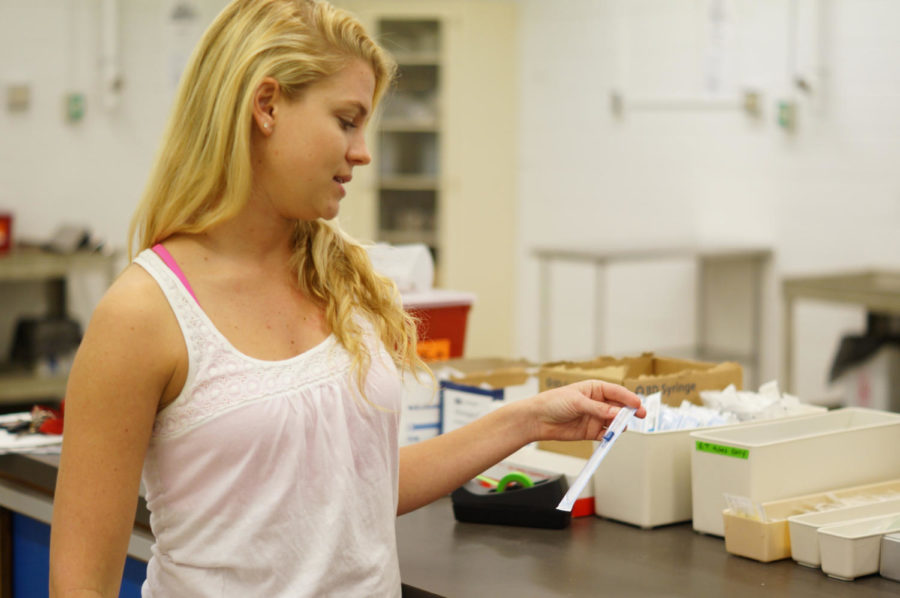Feral Cat Alliance offers spaying, neutering services at low price
Photo: Jessica Langr/Iowa State Daily
Jillian Sweet, year two in veterinary medicine and co-chair of the Feral Cat Alliance, shows a catheter, one of the many supplies used by the alliance in the preparation room on April 30, 2013. The club runs on donations and holds one clinic per month. “I’m really excited to do surgery. … I want to leave vet school being able to do spay and neuters,” Sweet said.
April 5, 2016
Spaying and neutering cats is just another day at the office for members of the Feral Cat Alliance.
The Feral Cat Alliance is a non-profit group made up of veterinary students. The group hosts clinics once a month, where it takes feral cats and provides low-cost spays and neuters, vaccinations and blood tests, as well as flea and tick medication and antibiotics if they are available or necessary.
Each cat is given vaccinations for rabies, feline rhinotracheitis virus, feline calicivirus and feline panleukopenia virus. They are also tested for the feline leukemia virus and feline immunodeficiency virus.
Both of these diseases are incurable, and if a cat is infected with either, the group is required to euthanize the cat. This helps improve the overall health of the feral cat population.
“I joined because I had a love of cats, and it is one of the few organizations where you get to do something outside of yourself,” said Jordan Gagne, second-year veterinary student and co-president of the Feral Cat Alliance. “Doing this, I know that we are making a difference in the community and in Iowa by reducing feral cat populations and improving the quality of life of these cats.”
The last clinic took place Saturday and was a mega clinic, where the group accepted twice as many cats as a normal clinic. Between 8 a.m. and 5 p.m. the club managed to spay and neuter 55 cats. Hosting this size of a clinic take a lot of planning.
Since the group is a non-profit, it relies mostly on donations of medications and supplies from the community. The group has two supply coordinators who are in charge of making sure that they have everything that they will need, while a donation coordinator accepts and handles donations to the group.
They also have a cat coordinator, who is in charge of lining up which cats will be accepted at each clinic. If caretakers are interested in having one of their cats spayed or neutered, they can email the cat coordinator, who then puts them on the waiting list. The cat coordinator then uses the waiting list to plan which cats will be treated. A volunteer coordinator ensures that there will be enough students to actually carry out the procedures.
Students at the event are divided into different groups and given different responsibilities. Some students are in charge of drawing and testing the cats’ blood, while others are in charge of sedating the cats or working in the recovery area for when the cats come out of surgery. To actually spay and neuter the cats, the students must have completed one semester of junior surgery.
The clinic is overseen by multiple clinicians, some of whom are Iowa State faculty, while some are local veterinaries.
“The Feral Cat Alliance is a great way to work with clinicians and your fellow students in a setting that is not a lecture hall,” said Liz Lamperelli, second-year veterinary student and co-president of the Feral Cat Alliance.







